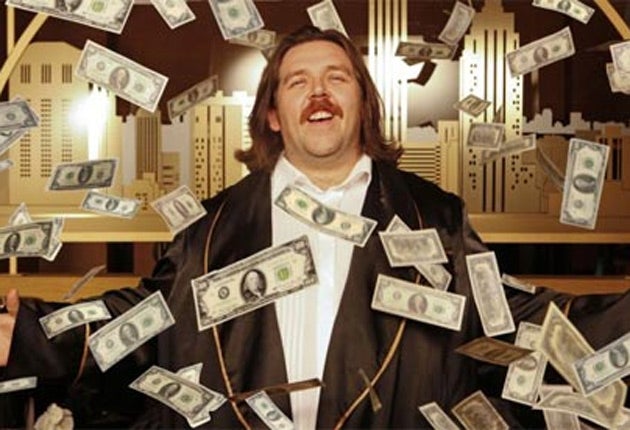The Weekend's TV: Money, Sun, BBC2<br/>Halcyon River Diaries, Sun, BBC1
Just not enough bang for his buck

Anyone with a love of Money, the Martin Amis novel, will be able to tell you the first thing that happens in the book – a minor cock-up that sets the tone for the more catastrophic ones that follow.
John Self, arriving in New York from London, gets into a row with a racist cab driver and finds himself jettisoned, in the rain, in the wrong part of town. Walking one block across to get to a southbound avenue he gratefully hails a passing cab, which turns out to be driven by the man who's just dumped him. You learn a lot about John Self from this one incident – about the mismatch between his cocky belligerence and his judgement – and you learn something about the book too, that it has a relish for the countless ways in which a life can go wrong. A bit dismaying, then, to find that Money, the television drama, had compressed this inaugural fiasco into a flaccid anti-climax. Self still insults his cabbie, but only after he's been safely delivered to his hotel, and only after the director has spent too much time proving that he can pastiche the more pensive passages of Scorsese's Taxi Driver. As Self thinks to himself, marooned on the pavement on 99th Street: "God, I hate this movie. And it's only just beginning."
It was a thankless task from the outset, let's be honest. Money is a voice before it's anything else – a hybrid of Self's and Amis's. And the book never shuts up, needling into your head with its private vocabulary ("sock" and "rug rethink") and its constant sense of being slightly out of control. To capture that you're going to need one hell of a voiceover (think of Peep Show, only more depraved), or a dramatisation that snaps from scene to scene, packing as much dialogue as is possible. Here, they hadn't done either. Nick Frost delivers an interior monologue, but does so at a reflective unhurried pace that suggests a bar-room philosopher, rather than someone frantically trying to catch up with the world. And long passages were entirely mute, as if a music track and long shots of Manhattan could even begin to match the caricatural extravagance of Amis's prose. Tellingly, when they stuck closer to his dialogue it began to work, as in the scenes when Self first begins to grasp the scale of the Hollywood egos he'll have to grapple with if his film is to get off the ground.
There is a big problem of casting, too. Nick Frost may just be too amiable to play Self. The point about the character, surely, is that his flab is the result of out-of-control appetite. He has to look as if he's gone off, through self-indulgence. Nick Frost looks as if he's never gone on in the first place, and he couldn't find a way here to bullshit convincingly. In an earlier attempt to bring the novel to the screen, Gary Oldman was down to play the role, and thinking of his combination of the fierce and the febrile, of his power to seduce, you can see one of the elements the character needs. "Cometh the hour cometh the slickmeister," says Self's American producer when they first meet, and though he has reasons not to tell the truth, the flattery is so far wide of the mark that it isn't remotely plausible. There's nothing slick about Self, and there needs to be at least a little to stoke your distaste. It's possible, I guess, that if you haven't read the book you'll take some pleasure from the Eighties detailing and the mystery of John Self's midnight stalker. But if you have read the book you'll be better off just reading it again.
In Halcyon River Diaries, Phillipa Forrester and her film-maker husband, Charlie Hamilton James, have cannily cracked the problem of the work-life balance, particularly tricky for a natural history cameraman who also has three young boys. Six months on the Serengeti takes a big chunk out of those precious early years, so instead Charlie is making a series about the river that runs past his front door. He actually films some of the footage through his own kitchen window, which means that he doesn't even have to get out of his dressing gown to go to work. I say "cracked", but there was still the odd difficulty with the career/private life interface, given that that four-year olds aren't very good at sitting immobile and silent for three hours while waiting for a water vole to emerge from its hole. This provoked a bit of marital banter: "Lying here doing nothing... this is the best job in the world," said Phillipa, trying to jolly him out of his grump. "Yeah. Reminds me of our wedding night that," replied Charlie, which struck me as an unnecessary escalation of hostilities.
It turned out that water voles don't actually travel around in tiny cabin cruisers, with friendly hamsters, as previous television accounts of riverbank life might have lead you to expect. They live their life in a state of almost permanent terror, along with the moorhen chicks and the dippers, who only have a fifty-fifty chance of dodging a predatory otter or a sparrowhawk. For an idyll there was an awful lot of sudden death around, and adultery too, with a kingfisher homebreaker trying to muscle in on another female's partner, and provoking a nasty bout of domestic violence. If humans were doing this it would be unsuitable for children. As it is it's perfect family viewing.
t.sutcliffe@independent.co.uk
Subscribe to Independent Premium to bookmark this article
Want to bookmark your favourite articles and stories to read or reference later? Start your Independent Premium subscription today.

Join our commenting forum
Join thought-provoking conversations, follow other Independent readers and see their replies